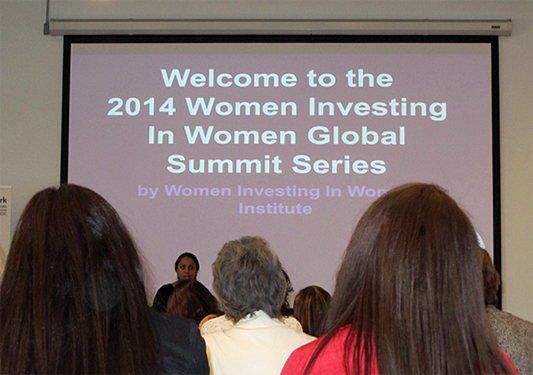
By Pamela Burke/January 29, 2014
“The answer to this global economy is women.” Sharon Lechter
It was billed as the Second Annual Summit for Women Investing in Women, a social movement of passionate individuals around the globe whose purpose is to support economic empowerment for women and girls. We at TWE were delighted to attend to shine the light on this exciting endeavor and see what we could learn.
The gathering in Scottsdale, Arizona, spearheaded by Anu Bhardwaj, the founder of the Women INVESTING in Women Institute, was an overwhelming success and offered terrific takeaway information that we want to share.
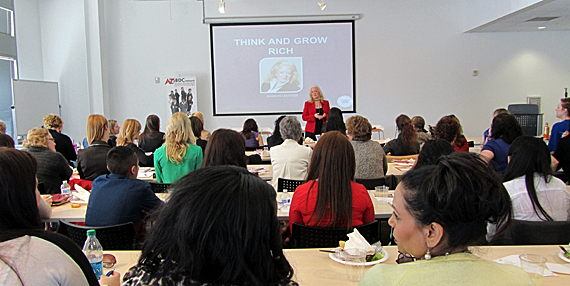
The Saturday session we attended began with Keynote Speaker Sharon Lechter, financial literacy activist and author of Think and Grow Rich for Women–Using Your Power to Create Success and Significance (Random House, June 2014). Her roots are in a small town in Georgia where she began to learn the ups and downs of the business world.
While working in the banking profession there, a customer named Harry told her he didn’t need her to wash his windows. She answered back, “I don’t do windows. If you want a bank loan, we can do business.”
And business she has done. In addition to being the CEO of Pay Your Family First, a financial educational organization, and a Chartered Global Management Accountant, Sharon is an international speaker, bestselling author, licensed CPA and mom. She talked about what a tremendous time it is for women to be in business. Why? Because there’s an increase in women getting funding. She advises them to take their passion and sometimes anger about their personal situation and reach out, to ask for alliances and think about finding a business partner.
“When you’re down and out, get up. Network!” Sharon Lechter
The mantra heard repeatedly during the Summit was ‘Take Action.’ As Sharon said, “When you’re down and out, get up. Network!” If you want to start a business, she emphasized that you have to be solving a problem or filling a need. Pretty simple and direct information. If you meet that criteria, get going with your idea, your passion and your new venture.
Sharon made a major point about the need to get rid of the word balance, used so often these days describing a goal sought after by women. “Balance is not achievable,” she said, emphatically. “When we are balanced, we are not moving.” Balance will be the subject of her next book as she strives to steer the current conversation away from the guilt of working women to positive goals of decision-making and helping others.
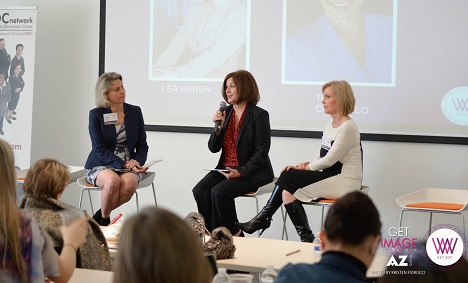
Sharon was followed by a panel on “Womenomics: Women Moving Trillions and What This Means,” moderated by Angela Raitzin, a Principal of Constellation Wealth Advisors in New York who had spent much of her career working in male-dominated businesses. She remarked that an attribute of women she has observed was a tendency to give but for some reason not to ask. Her good takeaway advice for the audience: Make it a point to ask for what you want and need in the workplace.
Joining her was Lea Haben, the founder of SmartFem.com, a magazine she created to educate and empower women. The motivation came from her now 23-year-old daughter who changed her mother’s life when she persuaded her to create a guide for women. Lea’s advice to new entrepreneurs was straightforward. “I don’t play small,” she said. “Think big and stay connected.”
“We have to think big. I want to be part of the
transformation of the world.” Trish Costello
Trish Costello, creator of Portfolia.com, which matches investors with growth companies, piped up, “We are living in the best time for women in history. We can bring our economic power to play. We have to think big! I intend to be part of the transformation of the world.” With Pinterest followers being over 80 percent women and Twitter over one-half, it’s time, Trish says, to step up as investors and determine the products we want to see.
More entrepreneurs followed with their tales of tough times and eventual success. Debbie Gaby, co-founder and President of Sleep America, the largest mattress retailer in Arizona, talked about growing up in Marshall, Texas, a town so small that it didn’t have a McDonald’s. One day, seeking to broaden her horizon, she packed up her car and her daughter and drove to Houston. That drive and her passion led to a career in realty and, in 1996, to launch the mattress company.
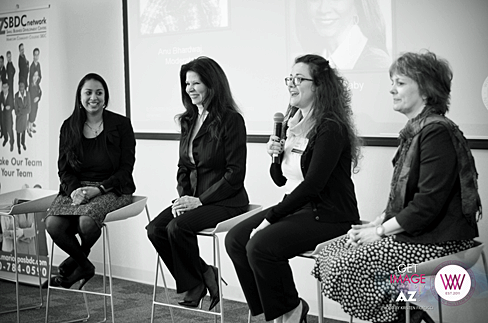
Jennifer Mannino and Nancy Sanders
Others on the “Entrepreneur” panel included business analyst Nancy Sanders and Jennifer Mannino of Subrosa Investigations who talked about how difficult start-ups can be; how important it is to have a strategy; and that it’s all right to ask for money. An important takeaway from this conversation: If the venture isn’t working, think about moving on.
A fascinating panel followed on “Mompreneurs: Doing It All & Doing It Well,” again moderated by Angela Raitzin, whose 3 1/2 year-old son was home in New York. The message here was that you might be able to have it all but probably not at the same time. Choices have to be made and each of the panelists had her own way of dealing with her work and home life.
Jessica Marriott, mom to 9-year-old twins, created Tantrum Bags when she saw that handbags for working women and moms were not functional. It was important for Jessica to be home and raising her family while starting her company so her biggest challenge was to figure out how to be successful. Belonging to an international fashion group helped her make contacts around the world while tending to her children in Phoenix.
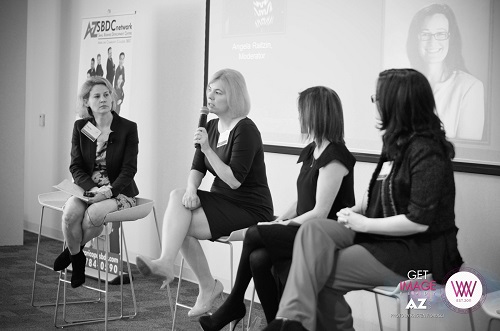
Michelle Howard, Jessica Marriott, Molly Castelazo
When asked what she might have done differently in the development of her business, Jessica said, “I was conservative and held back in the beginning. I would have just gone for it and then figured it out later.”
Michelle Howard, founder of ParaSlice and an IT consultant with four children under 7, had been an around-the-clock worker in previous jobs but now loves being an entrepreneur and mom because, she said, “it’s nice to do something else.” She makes it a point to integrate her children into her work and doesn’t shy away from taking them to business events.
With such a hectic schedule, how does she have her all? “Cross off everything that is not a 9 or 10 on your list,” she insisted, “and do not do them. Be ruthless about doing what makes you happy.” She gets great energy from doing everything that to her is a 9 or a 10.
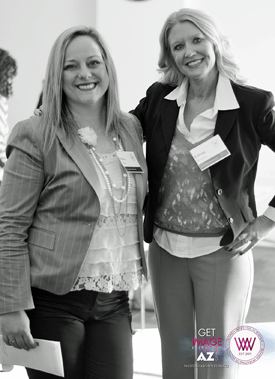
Another panel member, Molly Castelazo, founder of Castelazo Content and mother of two, remarked that she didn’t want to call herself a mompreneur until a dad said that he was a dadpreneur.
She was very clear about what is necessary to be a mom and a ‘preneur.’ “If you want to raise children and have a business, it takes two villages.”
The day wrapped up with observations about funding and growing companies. Amy Scerra, co-founder of Think Global Institute, described how her company is helping 250 women now in 26 countries to start and grow their businesses.
Entrepreneur Silvia Mah, who has a passion for start-ups, spoke about how important it is for women to know and understand their financials. “Build good strategic alliances,” she added. “Ask yourself whom you can collaborate with.”
Lifelong entrepreneur Felena Hanson, the founder of Hera Hub, spoke about her company’s successful efforts to create and provide comfortable work spaces for women. With three locations in San Diego, she is setting her sites on selling Hera Hub franchises around the country.
Mortgaging her house to start the business didn’t come easy for Felena, but she was looking for new challenges at the time. Her advice for success: Make sure you have a good advisory board. You can pick their brains , and most importantly, you need a network.
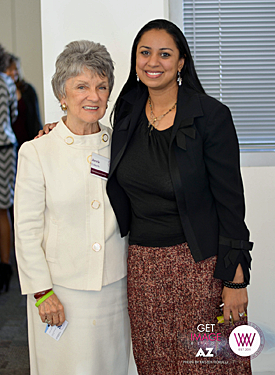
WIIW Founder Anu Bhardwaj
Anu, a 2008 U.S. Fulbright scholar, global fundraiser and mom to a 3-year-old, has lived in Phoenix for less than a year but was able to organize this stimulating conference in only a few months.
The Summit Series has been seven years in the making, but is well on its way to spreading its message around the world. Future events are planned in New York City, Stockholm, Silicon Valley, Johannesburg, Singapore and in Scottsdale again next year, January 9-10.
Anu’s goals for WIIW are important and urgent: to give entrepreneurs access to capital; to get more women on corporate boards and in the private equity industry; and to increase the overall number of women investing in women.
These are high aspirations, but as Anu says, “We have money; we have power; we need to focus on each other. Women INVESTING in Women Institute is fueling a global economic empowerment revolution.”
###
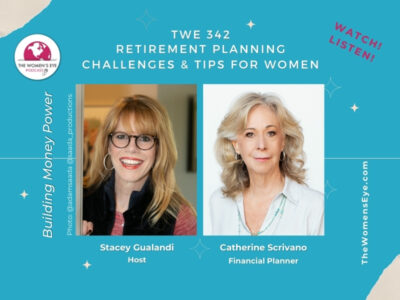


Leave a Reply